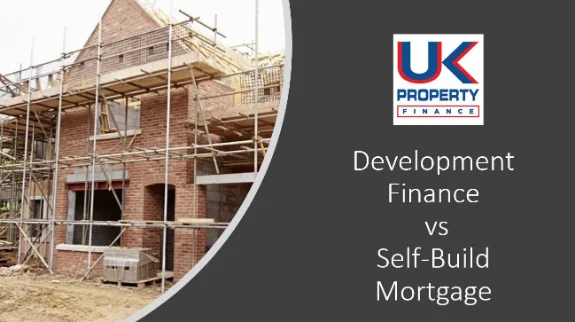Development Finance vs Self-Build Mortgage

Major construction projects often call for equally major financial support. Unless you’re already sitting on a stockpile of cash, you’ll need to enlist the help of a specialist lender.
In which case, you’ll be looking at a choice between two viable yet very different funding solutions:
development finance or a self-build mortgage
While both options could provide you with the funds you need to successfully complete the project, each has its own unique pros and cons. So rather than choosing at random, it pays to consider both options carefully and decide which works best for you.
Self-Build mortgages
Examining self-build mortgages first, these specialist funding solutions are designed for lenders looking to build a property from scratch, extensively renovate a current property, or demolish and rebuild a property.
One of the key provisions of a self-build mortgage is that the individual applying for the loan becomes the occupier of the property upon completion of the project. As a result, the vast majority of self-build mortgages are provided in the form of a regulated residential mortgage. The difference is that, unlike regular mortgages, the funds provided with self-build mortgage loans are released gradually as the project progresses.
For the typical homeowner looking to renovate, expand, or rebuild their current property, a self-build mortgage could prove ideal. Likewise, anyone planning to build their own dream home from scratch could access the funds they need by way of a secured self-build mortgage.
Nevertheless, self-build mortgages are relatively limited in scope and have very restrictive terms and conditions.
Development finance
By contrast, development finance is far broader in both scope and flexibility. Development finance is a dynamic funding facility for residential and commercial property developers who intend to sell the resulting properties upon completion.
There’s no requirement for the borrower to become the owner-occupier of the property or properties being constructed. In addition, there’s also greater flexibility with regard to the types of properties being built and their intended purpose.
Along with new-build properties, development finance can also be used to fund extensive renovation, extension, and improvement projects. Development finance solutions are tailored in accordance with the unique requirements and financial circumstances of each applicant individually.
As development finance is geared towards developers building and ultimately selling properties, it isn’t a suitable funding solution for individuals planning to build homes for themselves.
Key features of development finance
While self-build mortgages bear many similarities to traditional mortgages, development finance is an entirely different funding solution. Some of the most important features and characteristics of development finance include the following:
- Flexible finance can be obtained to cover the costs of new property construction, the refurbishment of existing properties, and property conversions.
- Borrowers can apply for development finance to assist with single properties and multi-unit developments.
- Development finance is typically available from £500,000 and up, with no specific limitations imposed.
- Most lenders will provide development finance to cover a maximum of 75% of the property’s gross development value.
- Terms and conditions are highly flexible to accommodate the requirements and budgets of a diverse field of borrowers.
In summary
Roughly summarised, self-build mortgage products are open to applicants who intend to build or renovate a property they will go on to occupy. With development finance, commercial property developers are offered financial support to fund more extensive projects for business purposes.
In both instances, the key to finding the best possible deal lies in comparing loans from as many specialist lenders as possible. Compare the market with the assistance of an independent broker, incorporating major High Street lenders and the UK’s most dynamic property finance specialists.
